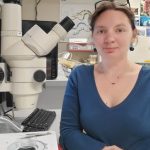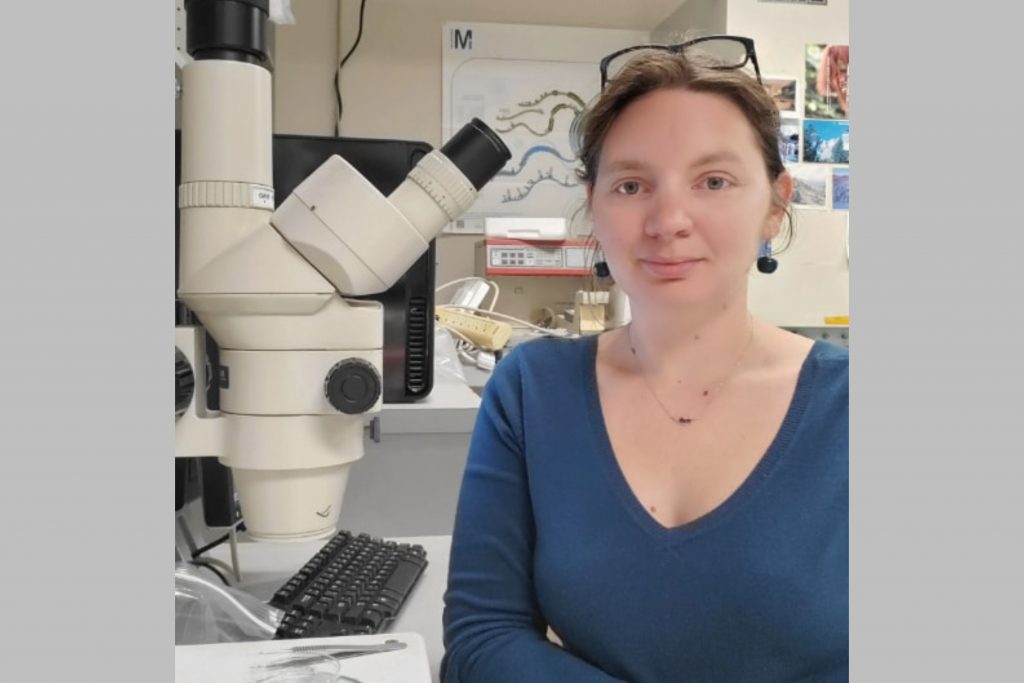We’re taking time to get to know the members of the GSA’s Early Career Scientist Committees. Join us to learn more about our 2020 early career scientist advocates.

Marie Berenguer
Early Career Scientist Community and Membership Engagement Subcommittee
Development, Aging, and Regeneration Program, Sanford Burnham Prebys Medical Discovery Institute
Postdoc Associate
Research Interest
Embryonic development is a complex process in which genetic, epigenetic, and environmental factors intervene. My research interest is to provide a comprehensive understanding of how gene expression regulation could contribute to key functions during embryonic development and how dysregulations may lead to developmental defects. I am particularly interested in retinoic acid (RA) signaling and the impact this has on forelimb formation and body axis elongation. As the active molecule derived from vitamin A, RA is highly influential in embryonic development as shown by the embryonic defects observed following RA exposure or an RA deficiency during pregnancy. However, the precise functions of RA during the early steps of embryogenesis are still unclear.
I am studying a genetic mouse model that is unable to produce RA. During my research, I observed changes in epigenetic markers and gene expression compared to mice which were capable of producing RA by combining genomics methods known as RNA-Seq and ChIP-Seq. My results highlighted candidate genes to research further. My goal is to identify the genes directly involved in developmental processes from among these RA-regulated genes by generating knockout mouse models using the CRISPR/Cas9 genome editing technique. By learning how RA normally influences embryonic development, these studies will provide applicable knowledge for improving regenerative medicine and genetic counseling as well as inform innovative therapeutic approaches for genetic developmental diseases.
As a PhD-trained scientist, you have many career options. What career paths interest you the most?
As a young researcher, I have particularly enjoyed developing my projects from the initial idea to publication and establishing collaborations to learn key skills. I enjoy both moving my project forward and redirecting the original experimental plan depending on the newly obtained data. I also find helping individuals understand complicated processes rewarding. Therefore, I want to become an independent investigator and lecturer in genetics and developmental biology in an academic setting.
I am excited to be able to pursue my own research project in the future using cutting-edge techniques and forming new fruitful collaborations. As an early career scientist, I am looking to expand my skills to become a successful researcher, teacher, and mentor. For example, I identified my leadership style thanks to the Torrey Pines Leadership Development Program, and I am further developing my leadership abilities through the Early Career Leadership Program in combination with the mentorship of undergraduate students in the lab. I also plan to grow my bioinformatics competences to process big data analyses as well as enroll in teaching workshops and lab management courses.
My ultimate plan is to dedicate my work to deciphering the molecular mechanisms underlying genetic disorders with developmental defects. I would like to focus my research on the first steps of translational research and explore basic scientific problems while keeping in mind the patients’ benefits. I believe that my research will not only improve rare genetic disease diagnoses and counseling, but also lay the foundation for future genetic therapies.
In addition to your research, how else do you want to advance the scientific enterprise?
I believe that we should associate science and communication together more often and to a wider audience. These efforts will help everyone to understand how our recent scientific discoveries can help communities to live better and healthier. We must also participate in science fairs and other public events to share our research with non-scientific audiences. I believe these strategies could help to reduce the denial of science observed all around the world. Additionally, communication among scientists is crucial for the development of every research project. I want to support better practices for publication and I have enrolled in the GENETICS Peer Review Program to educate myself about the challenges of reviewing publications.
I also want to share my unique experiences and my enthusiasm with my trainees, as I believe that one of the major purposes of a researcher is to train new generations of researchers. To promote vocations in STEM, I want to make sure that students can identify a role model. To offer the students the possibility of viewing themselves as researchers, it is important to communicate more about scientists from diverse backgrounds, including Rosalind Franklin (structure of the DNA molecule), Ernest Everett Just (physiology of development, fertilization), Marie Maynard Daly (effects of cholesterol on the mechanics of the heart), and Emmanuelle Charpentier (CRISPR/Cas9 protein for genome editing). This strategy will also help to encourage diversity in classrooms and laboratories, promote personal growth, and enrich students’ educational experiences. Interestingly, accademia is one of the most international environments and it is a blast to use this particularity to promote a healthy society. I have experienced how working in a worldwide institute with scientists from multiple countries helps one to consider alternative points of views and benefits science. Thus, promoting international diversity in our laboratories could challenge presumptive beliefs, question our ways of thinking, and will undoubtedly improve the research.
Lastly, I want to develop my trainees’ critical thinking skills and teach them methods of gathering, organizing, and understanding all of the information they have access to in order to sort and understand this overwhelming flow of knowledge. I wish to ensure their success not only in their studies and scientific careers but also to teach them how to become informed citizens.
As a leader within the Genetics Society of America, what do you hope to accomplish?
As a postdoc associate I perform experiments, manage my research project, and develop my scientific expertise in order to achieve my career goal. Even if scientific skills are essential to become faculty, being a great leader is not innate. Thus, as a member of the Community and Membership Engagement Subcommittee (previously known as Steering Committee), I am looking to grow my leadership skills and communication abilities which will be beneficial for my future career. I am particularly interested in the organization of the virtual Science in a Snapshot seminar series, which gives early career scientists the opportunity to promote their work and practice their presentation skills. I am hoping that my commitment to the GSA Early Career Leadership Program will provide opportunities to young researchers to develop their careers.
Finally, I am extremely excited to develop new relationships with graduate students, postdocs, early career and established researchers, and journal editors. This diverse community will have a positive impact on my career trajectory. By meeting other early career scientists studying various topics within the genetics field, I hope to develop my knowledge in genetics, discover new experimental approaches, and eventually be able to build new collaborations.
Previous Leadership Experience
SBP-Science Network (SBP-SN): Co-chair of the Sanford Burnham Prebys postdoctoral association, 2019–present
Co-organizator of the annual Sanford Burnham Prebys Trainee Research symposium
Undergraduate mentor, SBP 2019–present
French Red Cross: Member of the first aid team and board committee member, 2013–2015.
Co-organizer of charitable races and awareness events on food waste, environmental issues, Health, discrimination/equity… 2014-2017
Contact Marie Berenguer:































